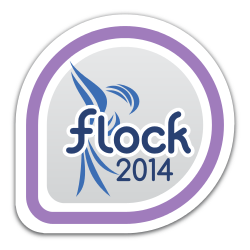
It was great that our proposal to speak on Waartaa at Flock, 2014 was accepted. So, I, along with Sayan went to Prague, Czech Republic last week to attend Flock. Flock was a 4 day event packed with loads of talk and workshops. It was like living in a dream at Flock. I was able to meet so many great people from the Fedora and Open Source community.
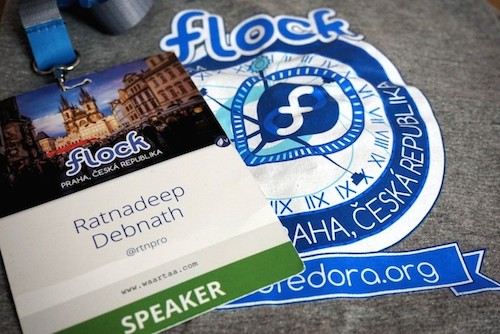
Day 1

The day started with an opening note from Matthew Miller, the Fedora Project Leader followed by a keynote by Gijs Hillenius on “Free and Open Source Software in Europe: Policies and implementations”. Gijs, an IT journalist, threw light on the state of adoption of Open Source Software by the European Union, it’s success so far, things that did not work out and how politics is playing a crucial role in the process. Then I attended the talk on “Better presentation of fonts in Fedora” by Praveen Satpute. In the talk,
Praveen expressed his concerns on the lack of good tools to manage fonts and that YUM is not sufficient for it. He laid emphasis on building a better infrastructure for managing fonts. This will help to grow community around
fonts and better quality fonts in Fedora.
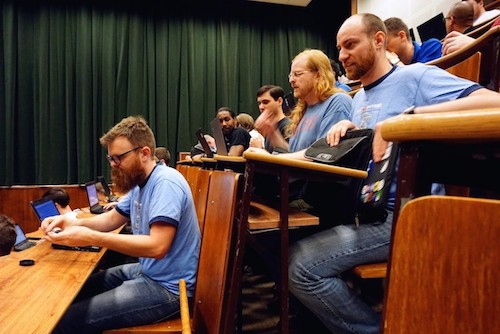
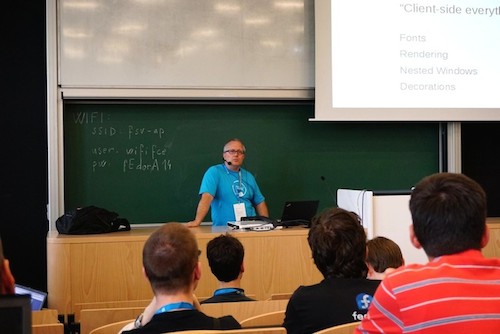
After this, I attended the talk on “Where’s Wayland?” by Matthias Clasen. Although, I could not make much out of the technical tits and bits of Wayland, yet I got some insight into how Wayland plans to replace X11 and improve application security in Gnome. After lunch, Hans de Geode spoke on “Wayland Input Status”. Here, I came to know about the complexities involved in handling events from input devices: mouse, touchpad, etc. and how they are evolving the input system for the upcoming Wayland integration. This was followed by a talk on “Predictive Input Methods” by Anish and Mike.
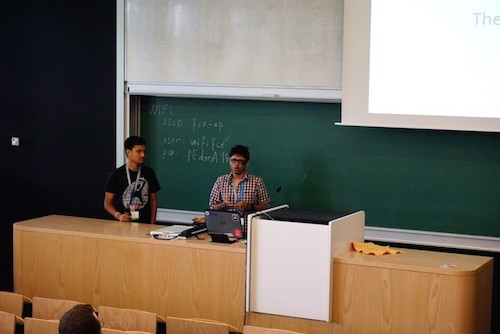
Then, there was our (me and Sayan) talk on “Open communication and collaboration tool for humans” where we spoke on the status quo in the field of communication and collaboration tools and the lack of competent tools for the same in the Open Source ecosystem. Then we showcased how we are trying to build a competent Open Source tool for communication and collaboration, i.e., Waartaa, it’s current feature and it’s roadmap. After our talk, I went to attend the talk on Mailman 3’s Hyperkitty by Aurelien Bompard, followed by the talk on “Fedora Badges and Badge Design” by Marie and Chris.
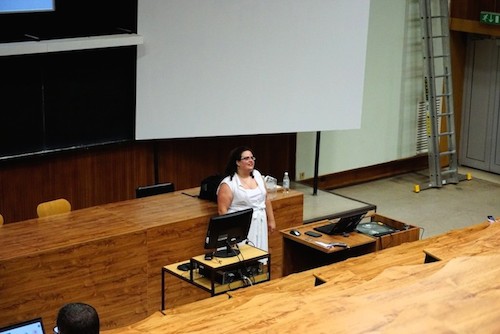
The day ended with a party at “The Pub”.
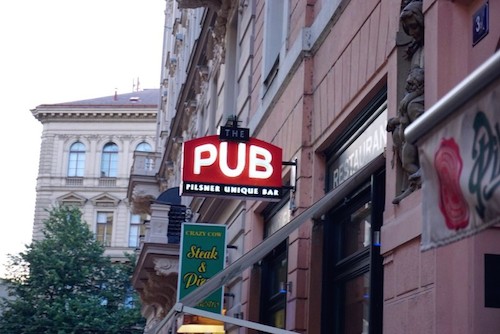
Day 2
The second day started with Pierre-Yves Chibon AKA pingou and Stanislav Ochotnicky speaking on the Fedora review server and how package review can happen without any bugzilla interaction. This tool will speed up the process of package review by eliminating time consuming to and fro communication between the package maintainer and the reviewer. The tool will also include integration with existing Fedora infra tools: FAS, koji, copr, etc. This was followed by an awesome talk on Ansible and it’s usage in Fedora Infra by Aditya Patawari.
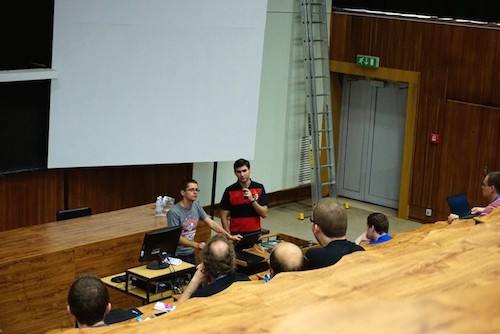
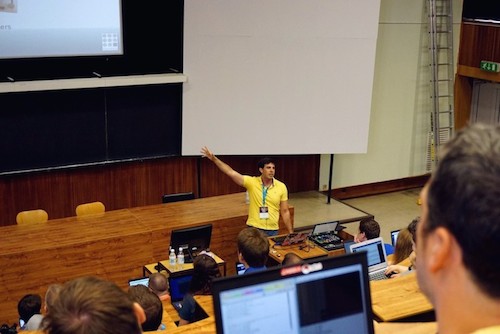
This was followed by the keynote on Novenna, the open laptop project, by Sean Cross. Sean spoke on how they built a laptop from scratch, how did the project start, the architecture of the laptop and their roadmap.
The rest of day, I was busy hacking on Waartaa and speaking people about it. Then, I attended the talk on “Rise of the Fedora Desktop: Gaming”. I recollected the days I spent tweaking Wine to run various Windows applications and games on my Fedora box. I shared my good and bad experiences with gaming on Linux with Gergely afte the talk.
The second day ended with an awesome boat party on the river Vltava.

Day 3 & 4
Well, I spent most of the last 2 days of Flock hacking on Waartaa. In between, I also attended quite a few talks and workshops. I started Day 3 by going to the talk on “Gnome: a content application update” by Debarshi Ray, a Gnome contributor and also one of my mentors in the world of Open Source. Then there was the joint session on Fedora Next, where Matthew introduced the respective project heads for different Fedora Next verticals. Each project head spoke about what is coming up for this release, roadmap for future and where they need helping hands.
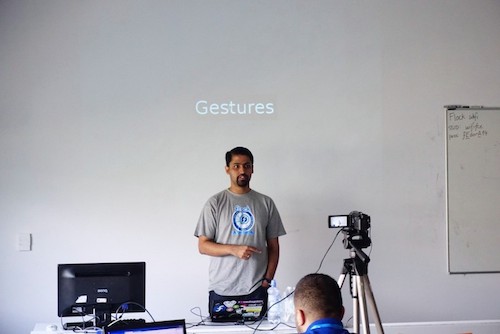
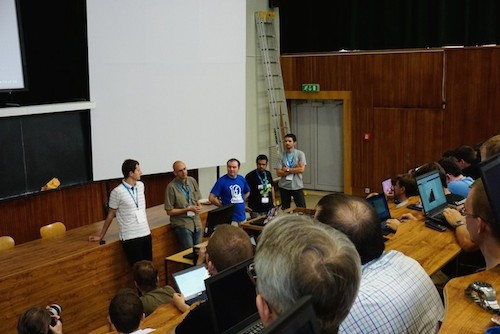
Then there was a group photo session before lunch. As always, it was Jared Smith who was taking the photographs, standing on the edge of a window a couple of floors above ;)
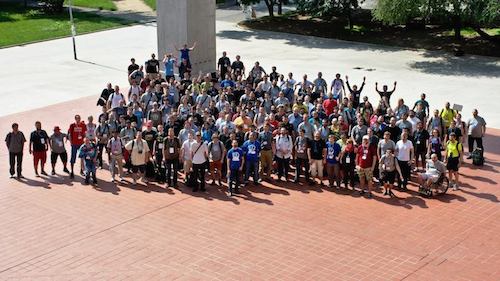
After lunch, I went to listen to Richard Hughes speaking on building the Gnome App installer from scratch. Following this, I attended the workshop on Fedmsg by our dear and awesome threebean.
threebean started with showcasing the basic API of fedmsg and finally went forward to implement a CLI based app which will tweet when one votes for a package on Fedora tagger.
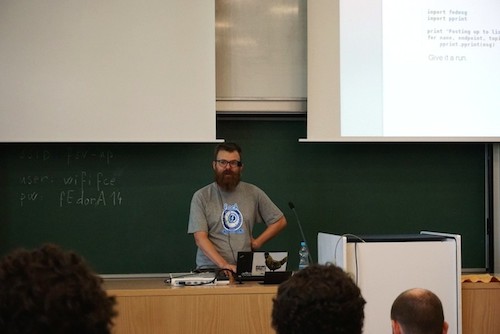
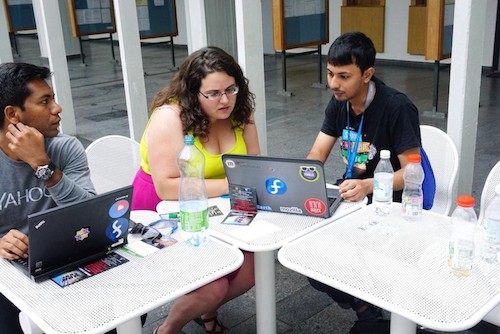
Following this I hanged around with Sarup and Marie, who were working on designing a logo for Waartaa. Thanks a lot, folks :), now we have a logo for Waartaa.
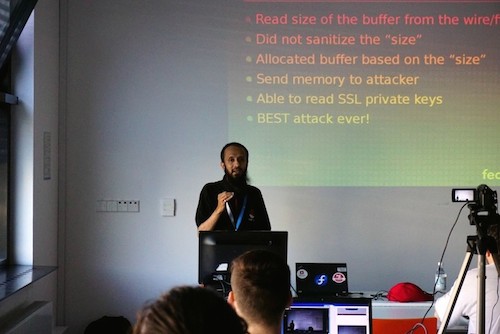
I started Day 4 by attending the talk on “Secure programming practices” by huzaifas. Then I went to listen to Langdon White speak on “Fedora for developers”. Then I went to listen to Justin Forbes speak on how to write kernel tests for Fedora. Post lunch, I resumed hacking again on Waartaa. I also went to the Gnome newcomers workshop. I tried to add GIMPNet IRC server in try.waartaa.com. However, it didn’t work out as GIMPNet IRC server doesn’t seem to support SSL, whereas Waartaa in production enforces SSL connection to IRC servers to ensure secure data transmission. I reported this issue to Marina.
Summary
It was a wonderful experience to attend Flock. Meeting so many fellow open source contributors, upstreams helped to strengthen my will of fire to contribute more to the Open Source ecosystem. There are a few projects I badly want to contribute to: Gnome, fedmsg, Mailman3, progit. But, I am currently too overloaded with the tasks in Waartaa. I guess that’s part and parcel of driving your own project. I made quite some enhancements in Waartaa during the conference. The important ones among them would be implementing route based navigation in the chat interface, on demand loading of data, and bidirectional pagination of chat logs (on going). This will help decreasing load time for waartaa, decreasing client side memory usage and will provide a better mobile experience. I spoke with Fedora infra team on various scale issues we are currently facing with Waartaa and discussed on how to overcome them. I also received a couple of feature requests for Waartaa. With support and feedback from the community, I will keep making Waartaa better and better.
Flock 2014 Youtube channel: https://www.youtube.com/channel/UCQIXiF6fxPCtHw_XwHFq6nA